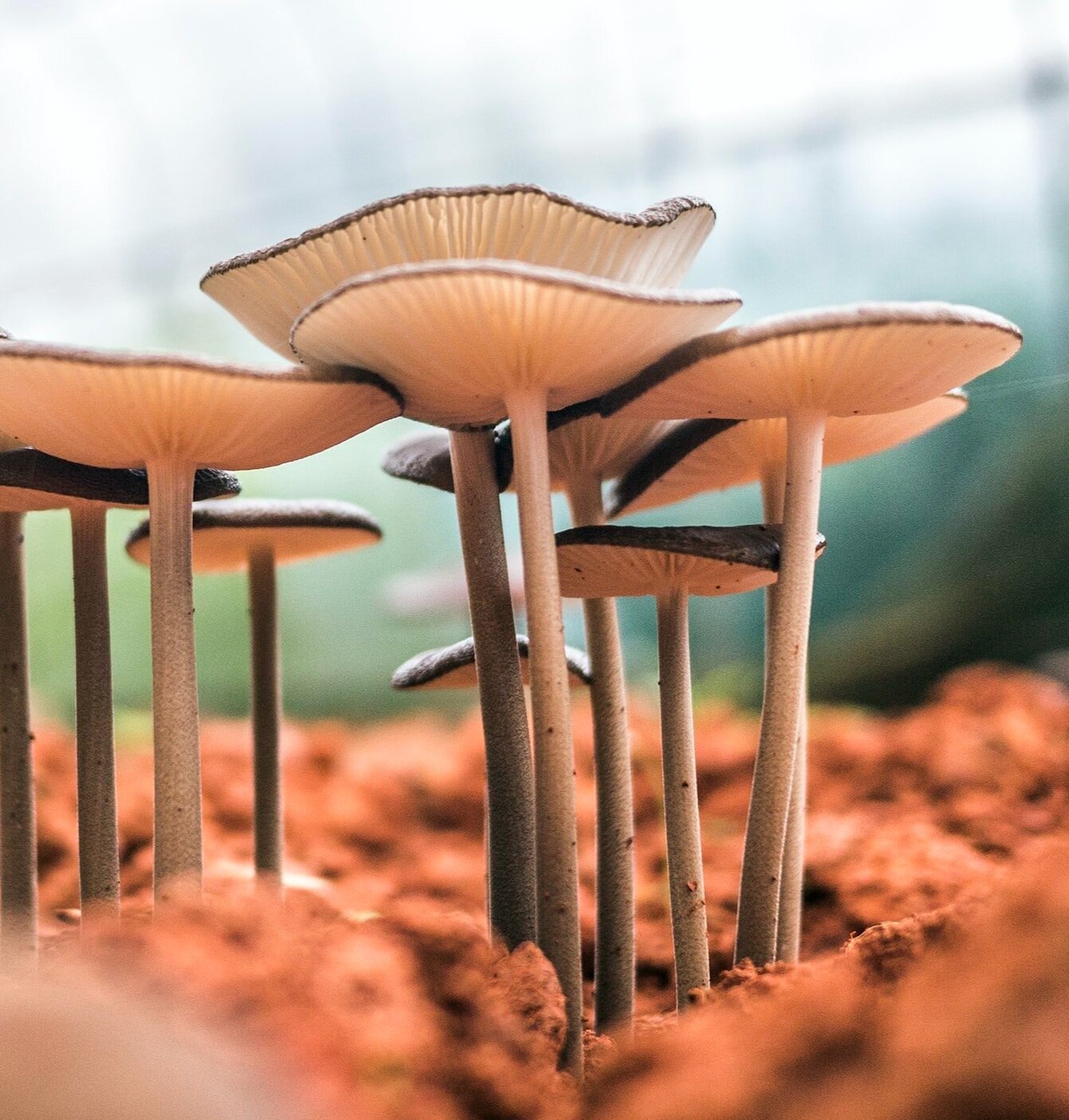Why You Want Mushroom Mycelium
Benefits beyond the fruiting body
1-2 minute read
Topics: Lion’s Mane, mycelium, erinacines, brain health, dementia
A quick lesson in mushroom anatomy
Fruiting body: the part that grows above ground
Mycelium: the part out of sight (my-SEE-lee-im)
Now that you’re a budding mycologist, let’s get to the point:
You’re shopping for functional mushrooms and see brands tout '100% fruiting body’, a claim used as a badge of honour.
Indeed, most fruiting body has beta-glucan polysaccharides (pol-ee-SACK-a-rides) and concentrations of 30% and upwards are optimal.
Before you buy, be sure what you need. There is a raft of research showing that mycelium is necessary for full benefit. As above, mycelium is not in the fruiting body. The different parts of the mushroom have different benefits.
In most cases, you’ll want both. Here’s why…
Using Lion’s Mane to explain
The fruiting body has polysaccharides and Hericenones (heh-RES-i-knowns — you‘ve got this). With the fruiting body alone you will have the common Lion’s Mane benefits: focus, concentration and clarity.
Now, the mycelium.
The mycelium has Erinacines. If you remember one tongue twister, it’s erinacine (eri-NAY-seen). These are special compounds because they are small enough to cross the blood/brain barrier (others are not).
Erinacines have several pharmacological effects, including:
Mediating neuropathic pain
Enhancing nerve growth factor (NGF)
Reducing β-amyloid deposition (symptomatic in dementia)
Erinacine ‘A’ in particular is special because it looks likely to combat dementia:
“it is highly suggestive that erinacine A is one of the key components responsible for the neurotrophic and neuroprotective activities of H. erinaceus (Lion’s Mane) [1].”
Building on research from the 1990’s, scientists are closing in on Alzheimers, Parkinson’s and stroke treatment and Lion’s Mane mycelium is showing solid promise [2-11].
So, what to do?
You could do worse than listen to experts like mycologist Paul Stamets:
“In my scientific opinion, mushroom products not incorporating mycelium are at a decided disadvantage, given the results of recent research.”
If you prize all-round brain health, look out for functional mushrooms with fruiting body and mycelium. Moksha works with leading scientists in functional mushroom research and includes fruiting body and mycelium in its range of products.
This is it
Moksha
Safety: Functional mushrooms like Lion's Mane are considered to be very safe, even in high quantities. However, if you have a mushroom allergy or auto-immune problems then you should seek advice from a medical practitioner.
Not all mushroom extracts are equal: Always look for high quality products. Consider Lion's Mane made with fruiting body, beta-glucan polysaccharides of 20-30% and mycelium-rich compounds. Beware high levels of fillers, starches and grains. While not harmful they are less beneficial.
Dosage: Generally, the recommended dosage is a minimum of 1g per day. A qualified practitioner will be able to advise on dosage for your circumstances. Everyday use is suggested as benefits are shown to correlate with regular consumption.
Disclaimer: The findings here are for your information but aren’t intended to diagnose, cure or prevent any disease. Always consult a qualified medical practitioner for advice. Please remember: do not eat mushrooms unless you know they are safe to consume.
Sources
Prevention of Early Alzheimer’s Disease by Erinacine A-Enriched Hericium erinaceus Mycelia Pilot Double-Blind Placebo-Controlled Study. 2020. Li IC, Chang H, Lin C, Chen W, Lu T, Lee L, Chen Y, Chen Y, Chen C, Pei-Cheng Lin D. Frontiers in Aging Neuroscience.
Post-Treatment with Erinacine A, a Derived Diterpenoid of H. erinaceus, Attenuates Neurotoxicity in MPTP Model of Parkinson's Disease. 2021. Kam-Fai Lee, Shui-Yi Tung, Chih-Chuan Teng, Chien-Heng Shen, Meng Chiao Hsieh, Cheng-Yi Huang, Ko-Chao Lee, Li-Ya Lee, Wan-Ping Chen, Chin-Chu Chen, Wen-Shih Huang, Hsing-Chun Kuo. Antioxidants, Basel Switzerland.
Erinacine A and related cyathane diterpenoids: Molecular diversity and mechanisms underlying their neuroprotection and anticancer activities. 2020. Christian Bailly, Jin-Ming Gao. Pharmalogical Research.
Erinacine A-enriched Hericium erinaceus mycelia promotes longevity in Drosophila melanogaster and aged mice. 2019. I-Chen Li, Li-Ya Lee, Ying-Ju Chen, Ming-Yu Chou, Ming-Fu Wang, Wan-Ping Chen, Yen-Po Chen, Chin-Chu Chen. PloS One.
Neurohealth Properties of Hericium erinaceus Mycelia Enriched with Erinacines. 2018. I-Chen Li, Li-Ya Lee, Tsai-Teng Tzeng, Wan-Ping Chen, Yen-Po Chen, Young-Ju Shiao, Chin-Chu Chen. Behavioural Neurology.
Erinacine A-enriched Hericium erinaceus mycelium ameliorates Alzheimer's disease-related pathologies in APPswe/PS1dE9 transgenic mice. 2018. Tzeng Tsai-Teng, Chen Chin-Chu, Lee Li-Ya, Chen Wan-Ping, Lu Chung-Kuang, Shen Chien-Chang, Huang F Chi-Ying, Chen Chien-Chih, Young-Ji Shiao. Journal of Biomedical Science.
Hericium erinaceus Mycelium and Its Isolated Compound, Erinacine A, Ameliorate High-Fat High-Sucrose Diet-Induced Metabolic Dysfunction and Spatial Learning Deficits in Aging Mice. 2019. Yun-Chieh Tsai, Yu-Chen Lin, Chun-Chih Huang, Oliver B Villaflores, Tzong-Yuan Wu, Shih-Ming Huang, Ting-Yu Chin. Journal of Medicinal Food.
Protective effects of Hericium erinaceus mycelium and its isolated erinacine A against ischemia-injury-induced neuronal cell death via the inhibition of iNOS/p38 MAPK and nitrotyrosine. 2014. Kam-Fai Lee, Jiann-Hwa Chen, Chih-Chuan Teng, Chien-Heng Shen, Meng-Chiao Hsieh, Chien-Chang Lu, Ko-Chao Lee, Li-Ya Lee, Wan-Ping Chen, Chin-Chu Chen, Wen-Shih Huang, Hsing-Chun Kuo. International Journal of Molecular Sciences.
The Cyanthin Diterpenoid and Sesterterpene Constituents of Hericium erinaceus Mycelium Ameliorate Alzheimer's Disease-Related Pathologies in APP/PS1 Transgenic Mice. 2018. Tsai-Teng Tzeng, Chien-Chih Chen, Chin-Chu Chen, Huey-Jen Tsay, Li-Ya Lee, Wan-Ping Chen, Chien-Chang Shen, Young-Ji Shiao. International Journal of Molecular Sciences.
Hericium erinaceus Improves Recognition Memory and Induces Hippocampal and Cerebellar Neurogenesis in Frail Mice during Aging. 2019. Daniela Ratto, Federica Corana, Barbara Mannucci, Erica Cecilia Priori, Filippo Cobelli, Elisa Roda, Beatrice Ferrari, Alessandra Occhinegro, Carmine Di Iorio, Fabrizio De Luca, Valentina Cesaroni, Carolina Girometta, Maria Grazia Bottone, Elena Savino, Hirokazu Kawagishi, Paola Rossi. Nutrients.
Chemical Constituents from Hericium erinaceus Promote Neuronal Survival and Potentiate Neurite Outgrowth via the TrkA/Erk1/2 Pathway. 2017. Cheng-Chen Zhang, Chen-Yu Cao, Miwa Kubo, Kenichi Harada, Xi-Tao Yan, Yoshiyasu Fukuyama, Jin-Ming Gao. International Journal of Molecular Sciences.




